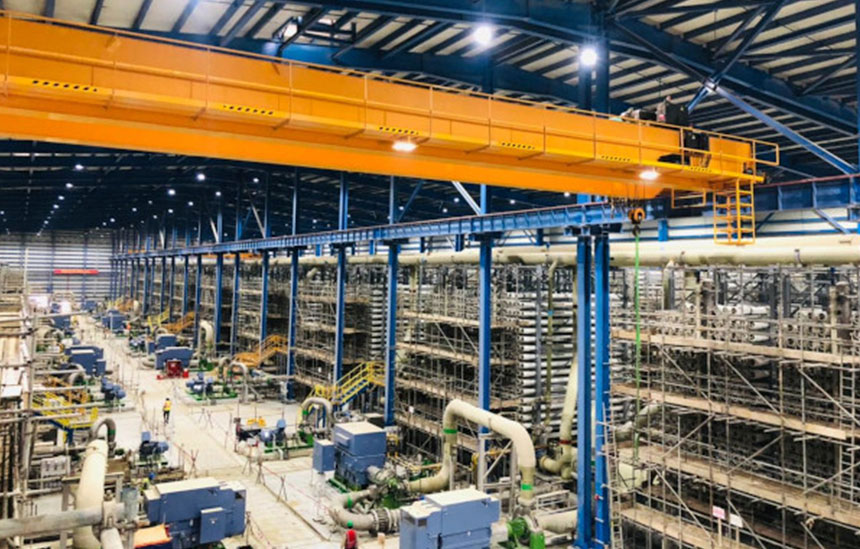- The plant has started producing drinking water at 25 % of its capacity and is successfully meeting the quality parameters specified in the contract.
- It will have a total capacity of 600,000 m3/day, the same as Rabigh 3, the largest desalination plant in commercial operation using reverse osmosis technology in Saudi Arabia, also developed by Abengoa.
- It will also be the world’s largest desalination plant to be partially powered by solar photovoltaic renewable energy.
Abengoa, an international company that applies innovative technology solutions for sustainable development in the infrastructure, energy and water sectors, has started exporting drinking water from the Jubail 3A desalination plant, reaching 25 % of its total capacity (600,000 m3/day) to the Saudi Water Partnership Company (SWPC). Abengoa, in consortium with SEPCOIII, is responsible for the engineering, procurement, construction and commissioning of the project for the leading company in the development, investment, ownership and operation of power generation and desalinated water production plants, ACWA Power. The Jubail 3A desalination plant is located south of the city of Jubail, in the eastern province of Saudi Arabia, in the northeast of the country.
This milestone achieved by Abengoa and their EPC consortium partners is a key milestone in the plant’s operational tests, which are part of the plant’s commissioning phase. Abengoa has thus been able to produce drinking water at the Jubail 3A desalination plant in compliance with the quality parameters specified in the contract. Subsequently, this capacity is expected to be increased in stages, from 25 to 50 % of its total capacity, and from 50 to 75 %, until finally reaching 100 %. In this way, the required contractual tests will be continued, with the objective of bringing the plant into commercial operation and producing drinking water to meet the demand of a population equivalent of 3,000,000 inhabitants.
Jubail 3A will be the first and largest in the world to be partially powered by renewable energy generated by a solar photovoltaic plant (45.5 MWp) as part of Saudi 2030 vision to reduce Carbon Emission globally. Thus, the plant will produce drinking water in a sustainable and efficient way, being the first experience of Independent Water Project (IWP) in Saudi Arabia on a commercial scale.
The project includes seawater collection (14 km of pipes under sea), pumping station, pre-treatment, reverse osmosis system with energy recovery, post-treatment, product pumping station with 3,5 km of interface pipeline till delivery point, product water storage tank for one day of production, effluent treatment, outfall discharge and an integrated photovoltaic solar field, as well as the associated electrical installations, which include the construction of a 380/33 kV electrical substation and 11,5 km of OHTL.
Abengoa, world leader in desalination
This milestone reaffirms Abengoa as a world leader in desalination. Abengoa’s capacity to undertake and successfully complete projects of high technical complexity, as well as to adapt to adverse working conditions, providing an optimum response to the client’s requirements, is evident throughout its history.
Abengoa is also strengthening its presence in the Middle East, where it has a very extensive portfolio: in Saudi Arabia, Rabigh III (600,000 m3/day) (recognized by the Guinness World Records™ as the world’s largest reverse osmosis technology plant built to date) and Shuaibah III (250. 000 m3/day), both already completed; Dubal (47,750 m3/day), in operation and Taweelah (909,218 m3/day in total (phase one + phase two)), which is already producing water satisfactorily, in the United Arab Emirates; and Salalah (114,000 m3/day), in Oman, also completed.
Worldwide, Abengoa has an installed capacity of more than three million m3/day, which will be increased to four million when the desalination projects in the start-up phase are completed. In total, Abengoa has a portfolio of more than 30 desalination plants in 13 countries.




